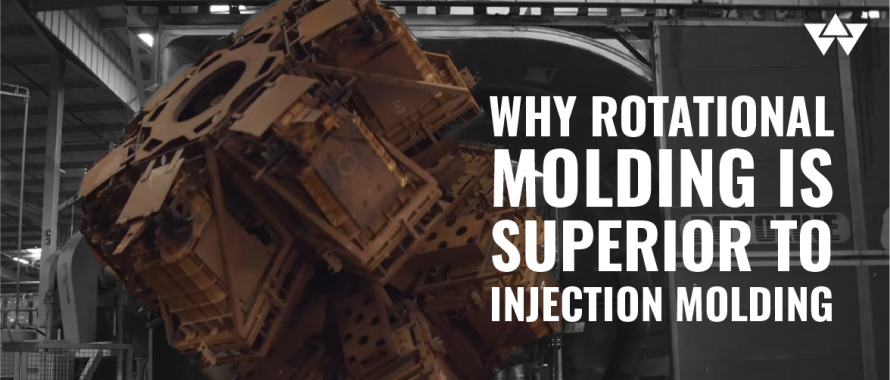At Toter, our brand is all about toughness, longevity, and quality. The foundation of that toughness is the crucial difference in how Toter carts are made. Through a process called rotational molding (our own version is called Advanced Rotational Molding), Toter creates a cart body that is tougher and longer-lasting than one made from an injection molding process.
Toter uses our Advanced Rotational Molding Process throughout our cart production lines, including with our newest cart, EVR-Green, the industry’s first 100% recycled cart body.
This article will uncover why rotational molding is superior to injection molding, where injection molded products fail, and how Toter’s Advanced Rotational Molding process is helping bring about a greener, more sustainable future for the entire industry.
First, what’s wrong with injection molding?
Injection molding is a manufacturing process for producing parts by injecting molten material into a mold to form a specific shape. The melt flow of the material plays a key part in determining wall thickness and consistency, as does the injection pressure and the mold itself.
In short: it’s difficult to achieve a consistent wall thickness with injection molding. For example, plastic injection mold products tend to be thinner in the corners, wherein the case of refuse carts and cans, impacts are likely to happen. When you also consider that injection-molded products can’t offer the same degree of material flexibility, it’s clear why an otherwise pretty tough product has some pretty devastating weak points, which are not forgiving of frequent abuse, or extremes of weather or temperature.
Why do some manufacturers produce injection-molded products?
Injection molding comes with some serious drawbacks, but some industries and applications demand less durability from their plastic products. In those cases, the weak points and potential for injection mold defects present less risk.
For the waste and recycling industry, however, material defects and inherent fragility are not qualities sought in cans and containers. In our industry, poly-based products—plastic dumpsters and residential carts—are beaten up and abused. Businesses and homeowners may dump corrosive materials, garbage handlers may beat up on the equipment, and both massive temperature swings and climate extremes put the poly material to the test.
How is Rotational Molding different?
Rotational Molding, also called roto-molding, is a thermoplastic process for producing hollow parts by placing powder or liquid resin into a hollow mold and then rotating that tool bi-axially in an oven until the resin melts and coats the inside of the mold cavity.
By rotating continuously, melted resin is distributed more evenly, preventing the formation of thin spots in the finished, cooled plastic. You’re only as strong as your weakest link, and rotational molding helps ensure every link is as strong as the next, to create a stronger finished product throughout.
Because rotational molding produces a more even application of the plastic material, the resulting product is more flexible and durable. Meaning, it’s less likely to crack in extreme temperatures or when beaten up by waste handlers on their runs.
How does Toter do Advanced Rotational Molding?
Toter’s Advanced Rotational Molding eliminates the built-in stress, weakness and brittleness associated with injection-molded products. In addition, Toter uses linear medium-density polyethylene (MDPE) that is specifically engineered for toughness and high-impact resistance. In contrast, injection-molded carts are made with high-density polyethylene (HDPE), which is rigid and brittle and offers poor impact resistance.
With rotational molding processes like Toter’s, you get superior toughness and durability, single-piece product design (no seams), consistent wall thickness, Ultraviolet (UV) stability, corrosion and chemical resistance, and custom colors.
What are some examples of Toter products featuring Advanced Rotational Molding?
All of Toter’s two-wheeled carts are made with Advanced Rotational Molding. Round Can, Slimline, our Front End Load Containers and Front End Dumpsters are also made with Advanced Rotational Molding.
Even our newest addition, EVR Green, the industry’s first 100% recycled cart body, is made with rotational molding, combining Toter toughness with industry-leading sustainability efforts.
Toter Toughness Built with Rotational Molding
Rotational molding makes Toter carts and cans superior in toughness, durability, longevity and service life.
